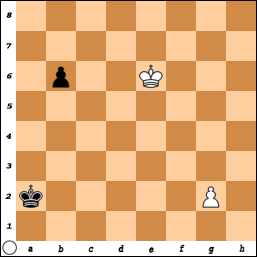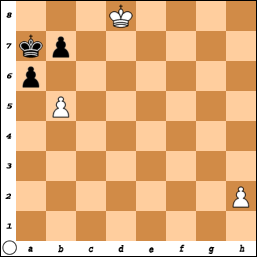
White to play and win. there is only one way to guarantee the win, and white has to be precise with his moves!



 As usual, here is the solution to the previous ending:
As usual, here is the solution to the previous ending: In this one, white needs to try to promote a pawn, and if you need a hint, he sacrifices his rook, and then black is forced to return the favour (in fact black gets to promote while white doesn't!)
In this one, white needs to try to promote a pawn, and if you need a hint, he sacrifices his rook, and then black is forced to return the favour (in fact black gets to promote while white doesn't!) White to play and win - the process involves gradually forcing the Black king down the board, followed by a pin driving the rook off the file. A full solution might appear here later!
White to play and win - the process involves gradually forcing the Black king down the board, followed by a pin driving the rook off the file. A full solution might appear here later!